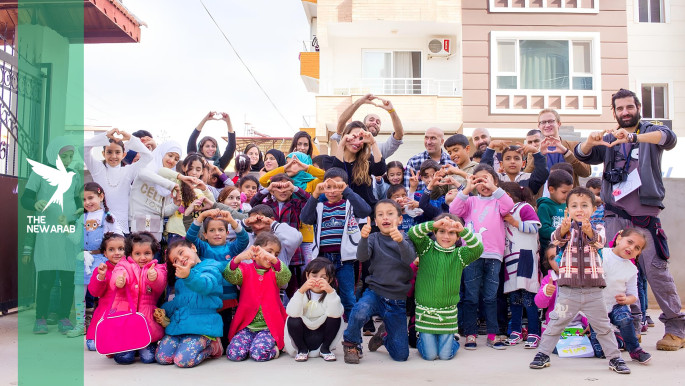The famous French cubist painter Georges Braque once described art as “a wound turned into light,” sparking an idea that creativity can fill a void where conventional methods of healing prove insufficient.
Creative therapy is now well integrated into therapy practices, including for the millions of children traumatised by the Syrian war, many born into exile in refugee camps far away from the embrace of their homeland.
For parents struggling to bring home the most basic provisions, many were resigned to their children’s lives confined within the perimeters of refugee camps, denied a voice or opportunity to fulfil their aspirations.
These are challenges the charity MyHomeland, or ‘Watanili’, has sought to address, offering a “safe haven for underprivileged children” where they can dream beyond the restrictions of their current situations and find solace in art and creativity.
This is achieved through three key pillars: art therapy and creative expression, allowing children to process trauma through art; filling in gaps in education with specialised and fun approaches to learning; and community initiatives to help families rebuild their lives through grassroots support networks.
Together, this has given children an essential tool to escape the drudgery of everyday life in camps and an opportunity to heal and grow from the trauma of the past.
“We’ve witnessed firsthand how profoundly art and creativity can impact the lives of children who have experienced displacement, trauma, and instability. For the children we work with, creativity isn’t just a form of play – it’s a pathway to healing,” Yara Tlass, co-founder of MyHomeland, told The New Arab.
“Through drawing, music, storytelling, and movement, they begin to express what words often cannot carry. They rediscover joy, they build confidence, and they start imagining a future beyond their current reality. We believe in providing the right tools and resources to help children overcome adversity – rebuilding a healthy, confident, and forward-looking generation, one small group at a time.”
Since 2014, MyHomeland has been supporting underprivileged children through arts, humanities, and creative educational projects [Instagram @myhomelandwatanili]
Rebuilding Syria
Breaking this cycle of hopelessness will be a critical step to rebuilding Syria as a whole, but the fall of the Assad regime has brought a brief window for the country to break away from the shackles and darkness of the past 14 years of war.
For Syrians in exile, it also means their children will finally be able to move home and start new lives as citizens with all the education, healthcare, job opportunities, and rights that were denied to them as refugees.
After nine years working in the camps of Hatay, Turkey, MyHomeland is now shifting its operations to central Syria, where many refugees are returning, in order to play a role in nation-building.
The charity’s long experience in formulating art and education programmes should make it easier for children to transition to a land that is technically their home but, for most, feels like an alien new world, especially since they have spent their entire lives abroad.
“This marks an important new chapter for us, allowing us to begin operating directly inside Syria and providing safe spaces of creativity and growth for a generation that needs it,” said Yara.
“We want to offer not just aid, but dignity, empowerment, and the tools to dream – to be whoever they want to be.”
Creativity as resilience, art as resistance, community as healing
Such endeavours will be costly, which is why MyHomeland has organised a series of fundraising events in London, Paris, and Beirut to finance the new chapter in the charity and the children’s lives.
As one might expect, art has been at the forefront of this campaign, with the opening event in London in June featuring talks from leading Arab artists, as well as poetry, stand-up, and music.
Kenza El Idrissi, a writer, artist, and co-founder of Halwaa Library, gave a moving poetry recital that touched on the devastation of war in the region in Palestine, Syria, and beyond.
Aser El Saqqa, founder and Managing Director of the London-based Arts Canteen, spoke about the challenges faced by Arab artists in the UK, where a surge of interest following the Gaza war has brought the scene scrutiny and plaudits.
Youssef Shoufan, co-founder of Syrian Eyes of the World, spoke about his work teaching Syrian refugee children the art of photography, with some of the young students’ work for sale and going towards the fundraiser.
Talal Karkouti took a sideways, satirical look at life as a British-Arab via a side-splitting comedy and music performance that featured ‘traumatic’ stories about za’atar sandwiches during school lunches.
Syrian-Canadian Youssef Shoufan discusses his work teaching Syrian refugee children the art of photography [Instagram @myhomelandwatanili]
Yara said the charity’s belief that art has the power to restore, rebuild, and reimagine was the inspiration behind the recent fundraiser in London, with future shows lined up in other cities that will assist families in making the move back to their homeland, and hopefully be the start of a positive new chapter in Syria’s future.
“The evening brought together a moving tapestry of artistic expression: a poetry performance that gave voice to untold stories, a light-hearted comedy sketch offering much-needed levity, a powerful photography exhibit capturing lives in flux, and a panel discussion on culture in crisis – exploring the role of the arts in times of conflict and displacement,” Yara told The New Arab.
“It was a night rooted in the same principles that guide our work with children: creativity as resilience, art as resistance, and community as healing. We are so grateful to everyone who joined us in celebrating the transformative power of culture and in supporting the children who need it most.”
To find out more about MyHomeland’s work, visit their Instagram page here
Paul McLoughlin is Head of News at The New Arab and author of Syria Insight. Follow him on X: @PaullMcLoughlin
